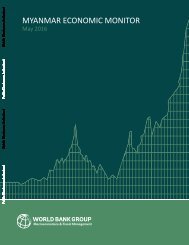Myanmar
1WZPRL1Jj
1WZPRL1Jj
- No tags were found...
Create successful ePaper yourself
Turn your PDF publications into a flip-book with our unique Google optimized e-Paper software.
CHAPTER 4. Policy implications<br />
The survey described above provides a wealth of<br />
information on the business environment for firms in<br />
<strong>Myanmar</strong>, the challenges they face and the issues<br />
of most concern to them together with aggregate<br />
information about participating firms. This information<br />
is of high value to policymakers looking to implement<br />
reforms that promote the private sector, create jobs,<br />
facilitate growth and enable broad-based economic<br />
development. The Government, the private sector and<br />
the international donor community must each play<br />
their part in developing and implementing the reform<br />
agenda. Some key policy implications emerging from<br />
the survey are discussed below.<br />
Business environment<br />
The importance of the business environment in<br />
promoting growth, productivity, employment and wellbeing<br />
has been well established (Abe and others,<br />
2012). The poor regulatory environment that plagues<br />
<strong>Myanmar</strong> has been discussed above. The survey<br />
results reveal dissatisfaction with several aspects of<br />
the business environment, with corruption and access<br />
to skilled labour, technology and land heading the list,<br />
although the importance of each of these obstacles<br />
appears to vary by sector. Furthermore, smaller firms<br />
reported having more trouble accessing finance while<br />
younger firms reported greater problems with the<br />
administrative bureaucracy. Infrastructure constraints<br />
are even more severe in some geographic regions. To<br />
address these issues the following recommendations<br />
are proposed:<br />
• Streamline procedures for business registration,<br />
licences and permits. This requires enhanced<br />
coordination between the various line ministries<br />
concerned. This would enhance the entry of new<br />
firms and reduce administrative transaction costs<br />
for SMEs. In this regard, a centralized database<br />
of business registrations and reliable industry<br />
directories could be developed;<br />
• Improve access to basic infrastructure such as<br />
electricity and water supplies. Ensure that access<br />
is equitably distributed across all geographic regions<br />
with specific industrial zone development plans;<br />
• Provide assistance to entrepreneurs and SMEs in<br />
overcoming specific challenges faced by them, such<br />
as access to finance and dealing with bureaucracy.<br />
This could take the form of an incubation programme<br />
and/or a full-fledged SME Development Centre;<br />
• Establish “single-window” SME service centres<br />
throughout the country to handle all applications<br />
for registration, licences and permits as well as<br />
to disseminate regulatory, financial, technical and<br />
market information. These centres could provide<br />
consultancy services and act as business incubators<br />
by providing financing, tax-related and other technical<br />
assistance to startups and entrepreneurs;<br />
• Create a regular consultation mechanism between<br />
the Government and businesses, through which<br />
concerns can be aired and then addressed for all<br />
sectors and all sizes of firms through a nuanced<br />
policy approach.<br />
Market and supply conditions<br />
Regional integration and exposure to global competition<br />
will provide opportunities as well as challenges for firms<br />
in <strong>Myanmar</strong>. Having been sheltered for decades, firms<br />
in <strong>Myanmar</strong> now face the daunting task of competing<br />
with foreign firms locally as well as attempting to gain<br />
market share overseas. The survey results reveal that<br />
most firms still have localized concerns, as smaller<br />
firms tend to obtain their revenue from local sources;<br />
issues such as foreign competition, foreign exchange<br />
and international sanctions were not reported to<br />
be obstacles to business activities. Most firms also<br />
report ambivalence to the launch of the AEC. Key<br />
requirements in this area are proposed below:<br />
65







